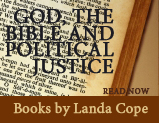Dieu, la justice biblique et politiques: Partie 3, Introduction
Troisième partie: Leçons politiques de l'histoire juive
Introduction
Israël et le droit historique
For Jews the Law is the entire Old Testament including the historical books. There was the Law as God gave it to Moses, prescriptif comme l' 10 commandements et la loi que Moïse interprété pendant la 40 years in the wilderness. But there was also the Law as revealed throughout Old Testament history as the Jews lived it out. We know the Jews understood the meaning of the Law by how they applied it and whether God was able to bless their application or not. En d'autres termes, the Jewish people where taught that the Laws of God were not only words but also deeds. One did not know if they understood the Law or not until they applied it, or actively “loved your neighbor as yourself.” In the context of the Hebrew understanding of “knowing” you “knew” the law if you could apply it to a situation, pas simplement le citer.
The greatest distinction between “religion” and “faith” in the God of the Bible is that religion is by definition a set of dogma we believe in. Biblical faith is action we take because of what we believe. Believing and action cannot be divided. Another way of saying this is that moral judgments are always situational, ou appliquée et dans des situations réelles, et pas des abstractions morales, idées qui peuvent être embrassé sans application. In following God we cannot just quote “thou shall not murder” without defining what murder is and working to stop it. You cannot say, “thou shall not steal” without defining the right to own and defending private ownership. So “the Laws of God” are not abstract principles, but principles and values applied in given situations. It is a living law.
Théologie, l'étude de qui est Dieu, cannot be understood in theoretical isolation. Biblically to be known and understood it must be applied. The God of the Bible does not have the slightest interest in “how many angels can stand on the head of a pin?” Because it has absolutely no application to the reality of the world He has created. God will not enter the debate over “how much you may sin and still be saved.” This is not a question the Bible seeks to answer. The whole point of the Bible is the pursuit of God and His Glory.
Quand nous disons que l' 10 Commandements nous disent de ne pas «assassiner» et nous concluons ou supposer cela signifie que nous ne pouvons pas être dans l'armée, ou la police, ou défendre nos familles ou nous-mêmes contre les attaques, nous avons mal compris. Ces conclusions sont diamétralement apposés à ce que la Bible enseigne sur le service militaire et le droit de protéger. Ces conclusions travaillent avec une définition très limitée de assassiner par la violence, éliminant la discussion biblique large de la mort par la famine à cause de la cupidité, mauvaises pratiques de construction en raison d'un manque d'intérêt, mauvaises pratiques d'assainissement et de santé dans la production d'aliments, manque de soins médicaux, etc. If we are to understand the Law we must understand the historical application of it in Israel through the lives of the kings and the message of the prophets.







